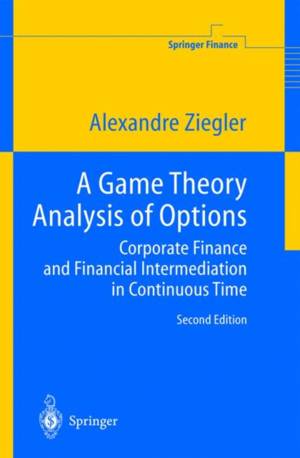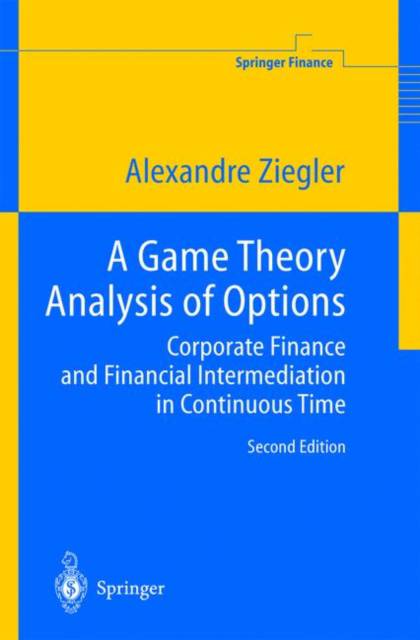
- Afhalen na 1 uur in een winkel met voorraad
- Gratis thuislevering in België vanaf € 30
- Ruim aanbod met 7 miljoen producten
- Afhalen na 1 uur in een winkel met voorraad
- Gratis thuislevering in België vanaf € 30
- Ruim aanbod met 7 miljoen producten
Zoeken
A Game Theory Analysis of Options
Corporate Finance and Financial Intermediation in Continuous Time
Alexandre C Ziegler
€ 158,45
+ 316 punten
Uitvoering
Omschrijving
Modern option pricing theory was developed in the late sixties and early seventies by F. Black, R. e. Merton and M. Scholes as an analytical tool for pricing and hedging option contracts and over-the-counter warrants. How- ever, already in the seminal paper by Black and Scholes, the applicability of the model was regarded as much broader. In the second part of their paper, the authors demonstrated that a levered firm's equity can be regarded as an option on the value of the firm, and thus can be priced by option valuation techniques. A year later, Merton showed how the default risk structure of cor- porate bonds can be determined by option pricing techniques. Option pricing models are now used to price virtually the full range of financial instruments and financial guarantees such as deposit insurance and collateral, and to quantify the associated risks. Over the years, option pricing has evolved from a set of specific models to a general analytical framework for analyzing the production process of financial contracts and their function in the financial intermediation process in a continuous time framework. However, very few attempts have been made in the literature to integrate game theory aspects, i. e. strategic financial decisions of the agents, into the continuous time framework. This is the unique contribution of the thesis of Dr. Alexandre Ziegler. Benefiting from the analytical tractability of contin- uous time models and the closed form valuation models for derivatives, Dr.
Specificaties
Betrokkenen
- Auteur(s):
- Uitgeverij:
Inhoud
- Aantal bladzijden:
- 176
- Taal:
- Engels
- Reeks:
Eigenschappen
- Productcode (EAN):
- 9783642058462
- Verschijningsdatum:
- 7/12/2010
- Uitvoering:
- Paperback
- Formaat:
- Trade paperback (VS)
- Afmetingen:
- 156 mm x 234 mm
- Gewicht:
- 276 g

Alleen bij Standaard Boekhandel
+ 316 punten op je klantenkaart van Standaard Boekhandel
Beoordelingen
We publiceren alleen reviews die voldoen aan de voorwaarden voor reviews. Bekijk onze voorwaarden voor reviews.











